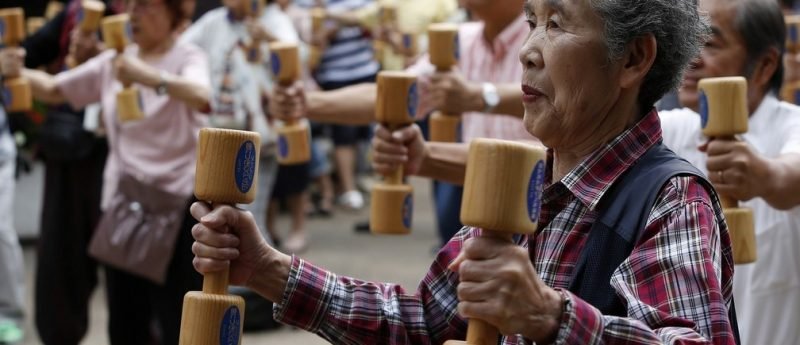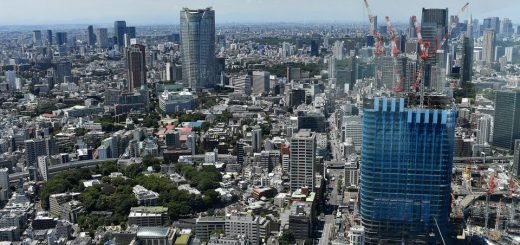Japan’s Ageing Population: Owing to the country’s declining economy

An ageing population and a plunge in the labour workforce have been on cards for Japan for decades, owing to the country’s declining economy. With the highest average median age of 48.4 years, above 25% of the country’s population is above 65 years. By 2030, almost a third of its population will be 65 years or older and one fifth will be 75 years or more. While for the world’s third-largest economy, all of this didn’t happen in a fortnight.
Various factors like declining fertility rates, increasing longevity, and post-war social evolution have played a significant role in shaping the country’s demography. According to the United Nation’s population estimates report, 2019 population of people between 65-100 years is anticipated to increase from 7.7 Million to 9.2 Million growing to an unprecedented degree with the life expectancy of the country increasing to 84 years from 72 years in five decades. The shift towards a more elderly demographic transition comes in two different forms. One, being an increase in the ratio of the elderly population, and second slower growth of new population directly linked with workforce participation in the country. While the former puts the burden on an already slowing economy through increased social security burden the latter correlates directly with the average workforce participation of the country. While many international organisations believe that the increase in longevity dividend will lead to better policy reforms, it is long from where Japan stands.
Economic & Governance Downsides:
Among the other G7 Countries, Japan is the slowest growing of them all, with the lowest GDP growth rates for a few years. A major chunk of the third-largest economy’s slow growth can be attributed to labour force shortage and increased social security spending of the country, which consequently increases the government’s debt. Budget deficits congregated to 226% of GDP in 2018. On the other hand, output growth has been constantly declining, in correlation to the decline in the labour force, which is expected to plunge by 1/4th by 2040. According to reports from the IMF, Pro-Growth policies, by Prime Minister Shinzo Abe – called “Abenomics” the three-arrowed policy plan converging a bold monetary policy with a flexible fiscal policy and a growth strategy have yielded some important results, but the country “will require a strengthened package of strengthened policies and accelerated reforms that exploit synergies”, warns the IMF.

The impact of social security schemes on public’s debt to GDP ratio and budget deficit have raised concerns over reforms in the already existing policies. Japan’s population fell by about 1 million between 2012 and 2017. “This will depress growth and productivity due to a shrinking and ageing labour force and a shift toward consumption, while fiscal challenges will magnify with rising age-related government spending and a shrinking tax base,” the IMF says.
Japan’s labour shortage is a chronic nightmare, and its workforce will fall by a further 8 million, by 2030 unless further changes are made, predicts the Organization for Economic Co-operation and Development (OCED)
The Triple Trouble – COVID-19, The Olympics & Vulnerable Population:
Health and long term spending on health and related services are expected to see a steep rise, and repercussions of Covid-19 pandemic is predicted to accelerate the growth in spending on critical care. According to a study by the United Nations University,” Covid-19 casualty is higher in countries where there is a large ageing population”. There is a strong correlation between dependency ration, in which Japan tops and mortality due to the disease. Demographic Nature of Japan is viewed as one of the most vulnerable, high risk. Japan is through the worst, but the impact of stringent lockdown and the state of emergency measures yet echoes in its economy.
It was expected that the now postponed Olympics and Paralympics would have a positive impact on Japan. Postponement of the games cost Japan huge sums, approximately around 32 trillion yen (US$297 billion). New employment of nearly 1.94 million people was also approximated, alongside huge economic benefits.

The Way Out and New Beginnings
Like each coin has two sides, the lockdown imposed as a part of pandemic control measures have kick-started Japan’s Digital story. The country‘s transaction base shifted to more digital platforms opening a window for the country. The World Economic Forum also looks at Japan’s challenges as new opportunities to revive its economy. Japan needs to strengthen its mutually reinforcing policies of “Abenomics” that helps the country boost its economic growth, lift inflation to meet the federal bank’s inflation target and stabilize public debt, says the IMF.


















